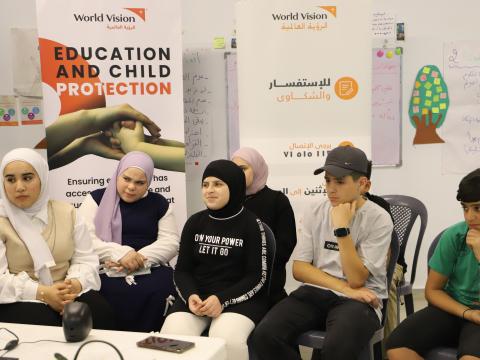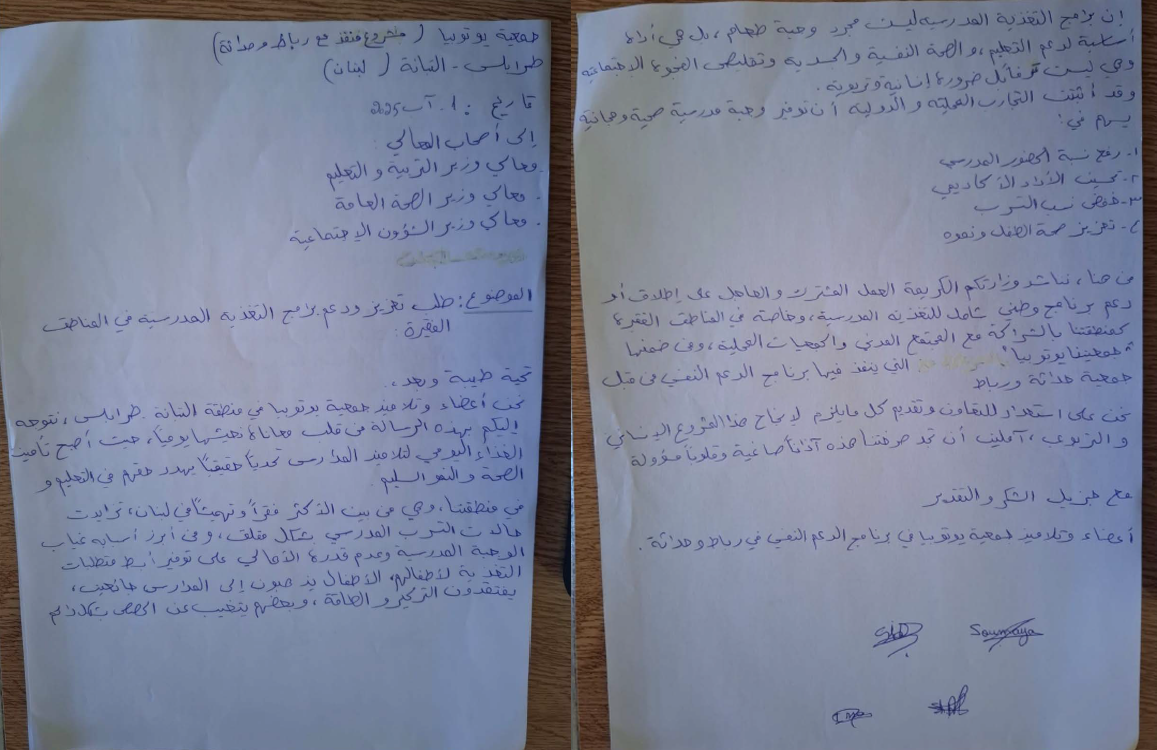Feed Our Right to Learn: Open Letter from Lebanon's Child Researchers


Who we are
We are a group of young students in the Al-Tebbaneh and Zehrieh area of Tripoli, Lebanon, whose ages range from 12 to 17, who wanted to share what school really feels like when there are no school meals. In Lebanon, there is no national school-feeding programme, meaning schools do not provide free meals to students. We did this research because many people do not know this is a problem. We want to raise awareness among children, parents, schools, and the government so that school meals become a reality.
This research is a component of School Meals Child Voice, a platform that brings together children from various countries to discuss ways to enhance school meals. The study on school meals was conducted during May and June 2025 using qualitative methods, including key informant interviews and observations from the lived experience of 19 students, including us as child researchers, who shared our views on why school meals matter, what is missing, and what we want to see change. We spoke with students from different backgrounds, especially in the most vulnerable communities, where poverty and school dropouts are high.
What we see at school
Every child we spoke to agreed that school meals are essential for health, learning, and well-being. Many of us arrive at school without breakfast because our families cannot afford it. This makes it hard to focus, and our energy fades before the day is over. Some of us only eat cheap snacks from the school kiosk, but they are often unhealthy and overpriced, sometimes costing double what they do outside school. That’s why many students simply go hungry. We spend around eight hours at school. That’s a big part of our day. Imagine eight hours going by hungry? This shouldn’t be normal. It should be part of the school’s responsibility.
Hunger doesn’t just make it harder to study; it affects how we treat each other. Students who have food sometimes bully those who don’t. When our classmates suffer from malnutrition, instead of helping them with food, parents just pull them out of school to avoid embarrassment. That’s the culture we’re in. But if you provide school meals, you’re not just helping a child eat; you’re helping end a whole culture of shame.”
What we’d change
We believe every child in Lebanon should be able to eat a healthy meal at school. The school feeding programme is not merely about providing food; it is a response to essential needs that support education, mental and physical health, and reduce social disparities.
A proper school feeding programme can:
Help more children come to school.
Help us do better in our studies.
Stop children from dropping out.
Make us healthier and stronger.
Here’s what we want:
Meals for all students, equally.
Nutritious meals with fresh fruits and nuts.
The food is designed to respect our traditions and meet our health needs.
Meals are served during the school day, when we need the energy.
Students participate in meal planning to minimize waste.
Schools and parents share responsibility, so it’s not a burden.
If free meals aren’t possible, schools should provide kiosks that offer healthy food at special prices for students.
Do they listen to us?
Most of us have never been asked what we think about food at school or if we even need school meals. But when we ask each other, almost everyone says yes, we do want to be heard.
Right now, it feels like everyone says they “can’t” help. Parents say they’re not capable. Schools say they’re not capable. The government says it’s not capable. So, who is it? Are we supposed to just lose our education, our health, and our future? Do we drop out of school to take charge of our lives and go find a living to eat?
We believe children should be part of the decisions that affect us. We’re ready to share our ideas, and we’re ready to work with schools and leaders to make them real.
In our open letter to the Ministers of Education, Health, and Social Affairs, we said clearly that school meals are not just about food; they are about giving children the chance to stay in school, learn better, and be healthy.
What we hope for
We hope for a Lebanon where no student has to choose between learning and eating. We hope for schools that care about our health, our happiness, and our future. We hope for leaders who listen to children’s voices and act on them.
We imagine a school where girls and boys feel welcomed, safe, and dignified, where the smell of freshly cooked food fills the school during the break. A school with a clean kitchen where cooks prepare hot, healthy Lebanese meals every day, rice and vegetables, lentils, fresh salad, some protein, chicken or meat, maybe even soup on cold winter mornings. We picture a bright dining space where we can sit together with our friends, laugh, and eat without shame or worry.
In this school, no one is left out. Every student gets a plate. The food is healthy, tasty, and enough to keep us full until the end of the day. We leave the dining hall ready to focus on lessons, play at recess, and dream about our futures.
We hope for a Lebanon where this isn’t just our imagination; it’s reality in every school.
Our message is simple: Feed our right to learn, feed our right to thrive.